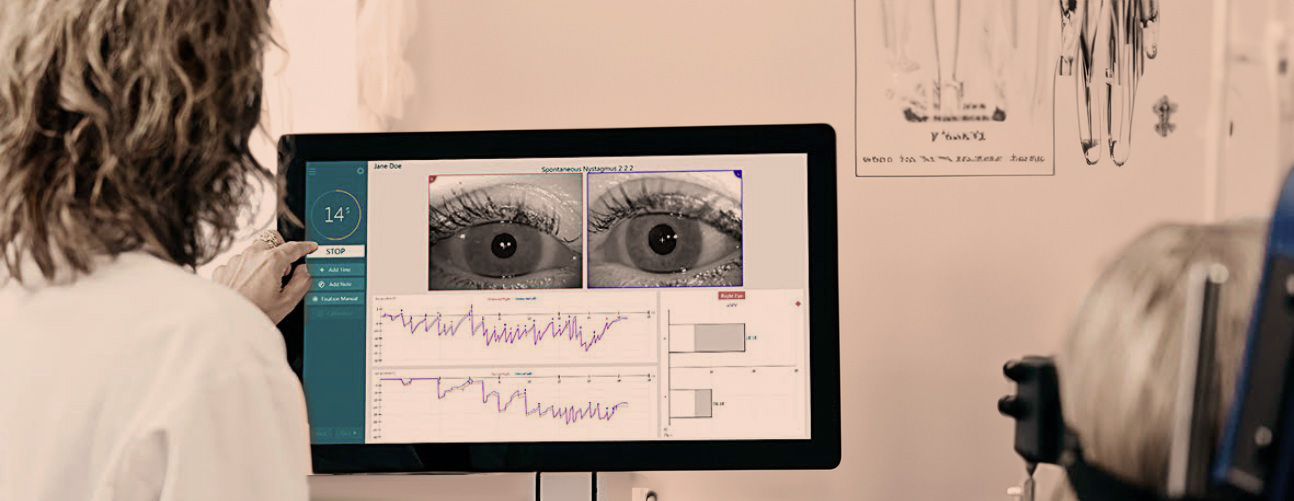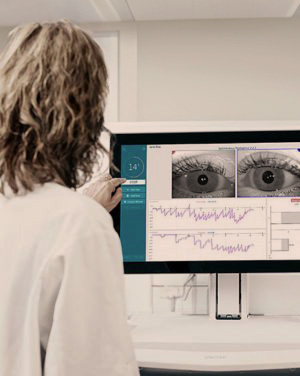

Vertigo
Vertigo is an illusion of movement caused in most cases by a pathology of the inner ear. Balance disorders, on the other hand, can be caused by a wide variety of factors (inner ear, eyesight, nervous system, muscles, joints, medication, etc.). Vertigo and balance disorders are extremely common. They affect patients’ quality of life and can lead to falls, with complications that can be very serious (falls are the most common cause of accidental death in the elderly).
In the event of dizziness or balance disorders, a comprehensive assessment is required. This includes a thorough medical history, an assessment of the impact of these symptoms on the patient’s life, an evaluation of the patient’s psychological context (PSS and HAD questionnaires) and the impact of visual information on balance (VVAS questionnaire), a microscopic examination of the ears, a videonystagmoscopic and neurological examination, supplemented, if necessary, by an examination of the cervical spine, posture and the manducatory apparatus (teeth, jaws, temporomandibular joints).


Evaluation of dizziness or balance problems
This systematically includes an assessment of hearing :
Tonal and vocal audiometry (vocal in silence, vocal in noise)
If necessary, this assessment can be supplemented by specialist investigations :
- Videonystagmography
Search of Otolithic Evoked Potentials (ocular and cervical VEMP) - Stabilometry
Search of Auditory Brainstem Response (ABR) - Search for Otoacoustic Emissions (OEP, OEAS, OEAP, PDA)
- Electrocochleography
If a visual cause is suspected, an orthoptic assessment can be performed at our centre :
- Orthoptic and neurovisual assessment (dynamic visual acuity, optic flow sensitivity, visual dependence, visual-vestibular conflict).
If necessary, we can also prescribe imaging of the inner ear, the neurological balance pathways and centers, the cervical spine and spinal cord, or more specialised examinations of the neurological system (electromyogram, lumbar puncture, brain scintigraphy, PET scan, etc.).
At the end of this evaluation, the patient’s causative pathology is usually identified. This may be :
- An inner ear disease: BPPV, Meniere’s disease, vestibular neuritis, acute labyrinthitis, labyrinthine hydrops, Minor’s syndrome, otosclerosis, labyrinthine fistula, traumatic labyrinthine damage, toxic, genetic, etc.
- A neurological disease affecting the balance centers : brain tumor, transient ischemic attack (TIA), stroke, multiple sclerosis, hereditary or degenerative diseases (Parkinson’s disease, cerebellar atrophy, etc.).
- Peripheral neurological damage.
- Phobic or anxiety symptoms.
Depending on the diagnosis, the patient may be referred for further evaluation to :
- An ophthalmologist.
- A neurologist.
- A psychiatrist, psychotherapist or relaxation therapist.
- A cardiologist.
- A stomatologist.
- An osteopath.
Once the diagnosis has been made, the following interventions may be suggested:
- Pharmacological treatment.
- Surgical interventions
- Vestibular rehabilitation.
- Orthoptic and/or neurovisual rehabilitation.
The management of vertigo and balance disorders is therefore complex. In all cases, it requires careful clinical assessment by an experienced otoneurologist and reasonably prescribed specialist examinations.
In addition, it involves multidisciplinary work, which in our centre takes the form of a weekly team meeting attended by otoneurologists, orthoptists, neurologists, neuroradiologists and audiologists, in order to make accurate diagnoses and propose appropriate therapies.
